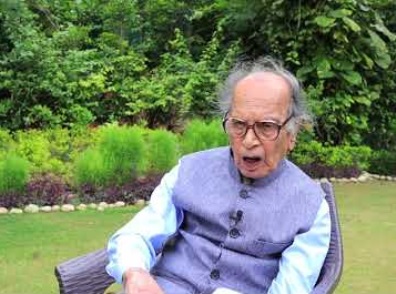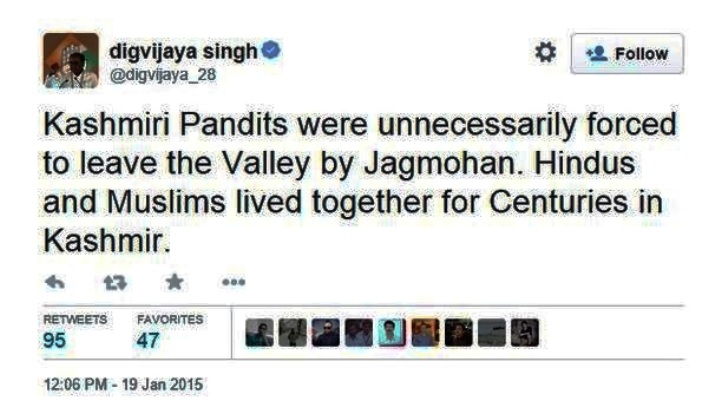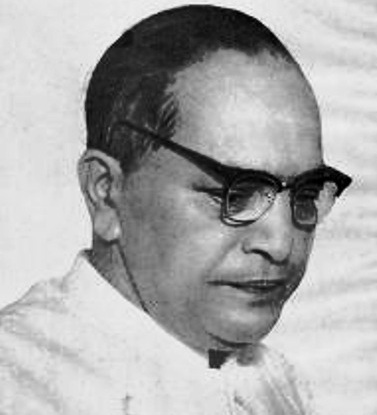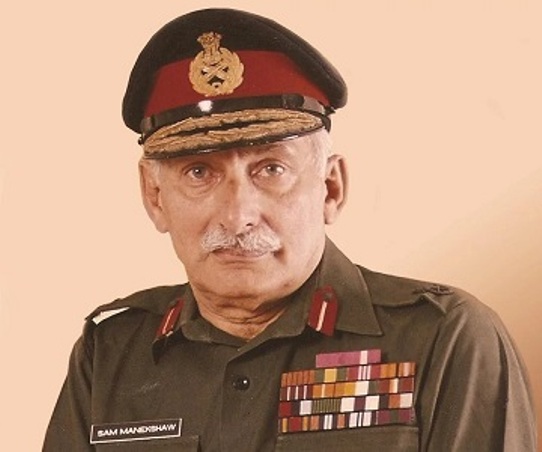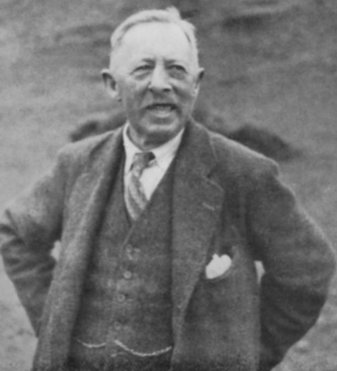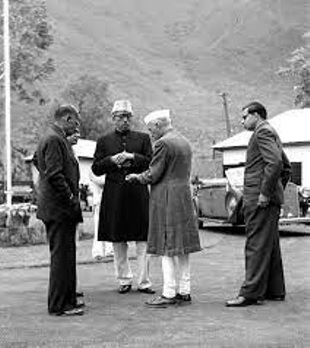REV CANNON CECIL EARLE TYNDALE BISCOE

BISCOE SCHOOL SHEIKH BAGH, SRINAGAR - KASHMIR
Tyndale-Biscoe quadruplet on the school motto "They say, what they say, let them say, what they say" in English and the vernacular (woh baktein hein kya baktein hein; baknaey dow jo baktein hein) would be on everyone´s lips. A polite but firm reply to adversaries that he had a mission to complete. Educating illitrate Kashmir´s Muslim population became a threat to elite and educated minority community and Biscoe thereafter faced a number of intrigues to sabotage his mission but Biscoe´s resilient and committed efforts culminated into a success story.
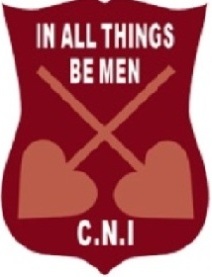 The school ever started in the heart of Srinagar city where Biscoe faced a chellenging task to convince people that the idea would transform their lives and would rid the society of almost all the evils. The stiff opposition from the orthodoxy and religious bigotry made things difficult initially but Biscoe´s perseverance made the situation somewhat easy as it slowly dawned on the people that society was definitely limping towards betterment.
The school ever started in the heart of Srinagar city where Biscoe faced a chellenging task to convince people that the idea would transform their lives and would rid the society of almost all the evils. The stiff opposition from the orthodoxy and religious bigotry made things difficult initially but Biscoe´s perseverance made the situation somewhat easy as it slowly dawned on the people that society was definitely limping towards betterment.
Biscoe´s (February 09, 1863 - August 01, 1949) efforts to educate and create consciousness in uneducated general public of Kashmir faced onslaught and sabotage from learned elite of minority community. Education monopolised by few even succeeded in poisoning the Muslim clergy against a "sinister plan of a Christian" to convert the local population. Biscoe fighting opposition and mischief supported by like minded enlightened few economically sound Muslims managed to start a school in the midst of illiterate population downtown city (Fateh Kadal, 3rd Bridge), controlled by Muslim religious orthodoxy, which by and by in spite of hurdles and impediments laid solid foundations for educating illiterate Muslim majority of Kashmir.
A British missionary, educationist born with the family name Biscoe later changed to Tyndale-Biscoe (1883) the third child born into a land-owning family of his father William Earle Biscoe and mother Elizabeth Carey Sandeman. Educated at Bradfield College, and then at Jesus College, Cambridge. A lover of sports especially in aquatics earning laurels by being instrumental in winning boat-races (Regatta) and was ordained as a priest of the Church of England.
Biscoe brought up in an environment of selfless service provided to humanity by Church Mission Society (CMS) became eager to do something tangible in the service of people in desperation in places like Africa and the Far-East. Visiting CMS headquarters at Salisbury he was appointed as missionary teacher to help Mr Knowles in Kashmir. In November 1890 Biscoe travelling for the destination unknown to him through Karachi and Rawalpindi, now in Pakistan, finally reached Kashmir. The State of Kashmir a Muslim majority was ruled by minority Hindu Maharajas whose despotic ruling tactics were overseen and watched by representatives (Residents) deputed by Her Majesty Queen Of England´s government in British India. The Resident´s job was to keep an eye on Maharajas as local Muslim population invariably complained to Her Majesty´s Government about atrocities committed by Maharajas supported by bureaucracy controlled by minority Hindu population. Though Kashmir was an independent country, the squalid miserable conditions and Hindu caste system a serious problem Tyndale-Biscoe embarked on a mission and used his own learned Christian values and western civic ideals to improve exploited and downtrodden Kashmiri society.
The State of Kashmir a Muslim majority was ruled by minority Hindu Maharajas whose despotic ruling tactics were overseen and watched by representatives (Residents) deputed by Her Majesty Queen Of England´s government in British India. The Resident´s job was to keep an eye on Maharajas as local Muslim population invariably complained to Her Majesty´s Government about atrocities committed by Maharajas supported by bureaucracy controlled by minority Hindu population. Though Kashmir was an independent country, the squalid miserable conditions and Hindu caste system a serious problem Tyndale-Biscoe embarked on a mission and used his own learned Christian values and western civic ideals to improve exploited and downtrodden Kashmiri society.
Tyndale-Biscoe´s educational philosophy was one in which conspicuous intellect, or cleverness, was valued less than the acquisition of more profound attributes and abilities. The high schooling placed emphasis on education, physical activities; mountaineering, trekking, boxing, boating, football, cricket, and swimming stimulating sense of courage, masculinity and physical fitness. Tug-of-War was generally a favourite of the students as it would be thrilling for the winning group to display a show of strength. The pupils were also engaged in civic duties, such as street cleaning, and in helping deal with flooding and cholera.
C.M.S. Missionary at Srinagar Kashmir played a memorable role not only in the education or sports field but multiplying educational institutions. These seats of learning opened in far-flung remote areas, opening of hospitals, dispensaries when medical care was unknown to Kashmir and more importantly create an awareness amongst people to fight for their rights and shun the attitude of being forbearing and tolerant to harsh treatment. Kashmir feels indebted and has always been looking for ways to thank this noble soul for doing so much good for Kashmir.
RECEPTION TO SOVIET DIGNITARY
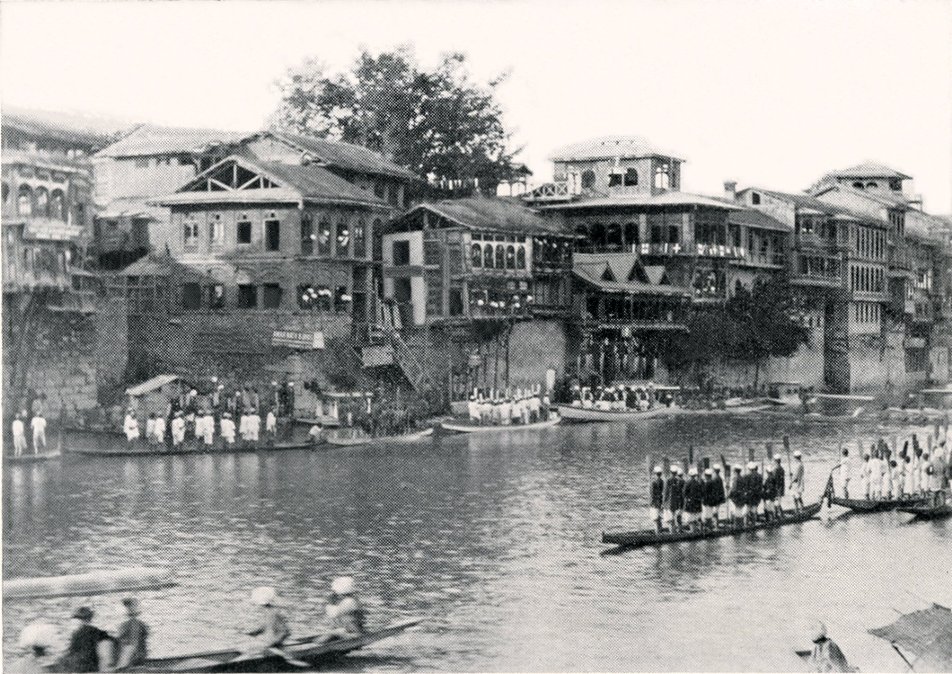 Right through the heart of Srinagar, River Jhelum reception given to the President Bulganian of Soviet Union to earn the VETO power to thwart the attempts of international community to settle the Kashmir Issue once for all. India always used one pretext or another to hoodwink the world and used delaying tactics to complicate the issue; finally justifying occupation using military power.
Right through the heart of Srinagar, River Jhelum reception given to the President Bulganian of Soviet Union to earn the VETO power to thwart the attempts of international community to settle the Kashmir Issue once for all. India always used one pretext or another to hoodwink the world and used delaying tactics to complicate the issue; finally justifying occupation using military power.FIRST BICYCLE IN KASHMIR
We usually went to school by boat until I brought the first bicycle to Kashmir, which caused even more astonishment than did the first motor-car many years later. My first cycle ride was at night. As I passed a coolie carrying a load, I heard a shriek and on looking back saw him on his back , shouting in terror:" I am dead! I am dead!" Poor fellow, he had heard much of djinns and at last seen one with his own eyes. (It is noteworthy to mention here that the first motor-cycle seen by Kashmir was brought in by the son of Haji Amir Joo, a bicycle merchant of Lal Chowk Haji Ghulam Nabi. This shop is right opposite Palladium Cenima and the shop is still run by his grand-children.)DEALING WITH BRAHMAN TRICKERY
Soon after my arrival in Kashmir I received calls from Hindu youths wishing to read the Bible with me. Some of them asked if they might come to my house after dark for fear of persecution from their co-religionists. This request I granted as I thought they were genuine seekers after truth. Later on so many came that I had to arrange for them to go to other missionaries. Hence a great deal of our time was taken up with these small groups. Before very long I began to suspect their motives, and, ere long, I was sure that they came for two reasons. One was that they wished to learn English from an Englishman as they asked us to use the English Bible instead of the Urdu Bible. But, what was more important, was that we might become interested in them personally and find lucrative posts for them in Givernment service, with a few advantages thrown in.
When they became too persistent in asking for more time to be given to them, and increased their sloppy talk, I thought it about time to draw the line. So I gave out that no one could "go Christian" as they called it, unless they first had a boxing match with my gardner, who was a Mohammedan. These "go Christian" hypocrites were all Hindus.
Biscoe in Kashmir (1890-1940) by Shafi Ahmed Qadri
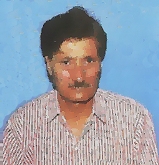 Reverend Cannon Biscoe patiently and persistently tried to instil in our youth the spirit of self-help, esprit de corps, and social service. The institutions with which he was connected were places where young Kashmiris not only were taught high and noble ideals, but were imbued with enthusiasm to strive for them. It is a source of regret to me that I have not had the good fortune of passing through his school. But those who have been under his care as students feel joy and pride to be known as Biscoe Boys. He breathed his own idealism, purity of thought, action and love of service into all his students, and made them models of uprightness, honesty and good character. He was a teacher in the real sense of the word.
Reverend Cannon Biscoe patiently and persistently tried to instil in our youth the spirit of self-help, esprit de corps, and social service. The institutions with which he was connected were places where young Kashmiris not only were taught high and noble ideals, but were imbued with enthusiasm to strive for them. It is a source of regret to me that I have not had the good fortune of passing through his school. But those who have been under his care as students feel joy and pride to be known as Biscoe Boys. He breathed his own idealism, purity of thought, action and love of service into all his students, and made them models of uprightness, honesty and good character. He was a teacher in the real sense of the word.
What makes his work all the more remarkable is the fact that elsewhere in India the gestures of foreigners, however friendly, were generally regarded with distrust and suspicion? But Cannon Biscoe set an example of how true relationship between two peoples, seemingly quite alien to each other, could be built on equal and human terms. By sheer self-denial, courage and toil, he created for himself goodwill and gratitude. He was regarded by the people of Kashmir as their friend and sympathiser. Today Cannon Biscoe is no more amongst us but his memory lives enshrined in our hearts and the traditions of selfless service that he has created will never die.
Prime Minister Sheikh Muhammad Abdullah (1949)
THE INITIAL CHALLENGE
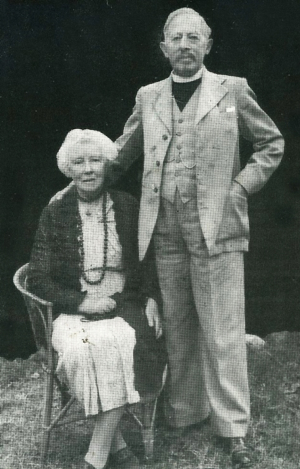 Biscoe was the third child of seven sons born to William and Elisha Earl Biscoe hailing from Holton in Oxfordshire, England. Biscoe brought up in an environment of selfless service provided to humanity by Church Mission Society (CMS) became eager to do something tangible in the service of people in desperation in places like Africa and the Far-East. Visiting CMS headquarters at Salisbury he was appointed as missionary teacher to help Mr Knowles in Kashmir. In November 1890 Biscoe travelling for the destination unknown to him through Karachi and Rawalpindi, now in Pakistan, finally reached Kashmir.
Biscoe was the third child of seven sons born to William and Elisha Earl Biscoe hailing from Holton in Oxfordshire, England. Biscoe brought up in an environment of selfless service provided to humanity by Church Mission Society (CMS) became eager to do something tangible in the service of people in desperation in places like Africa and the Far-East. Visiting CMS headquarters at Salisbury he was appointed as missionary teacher to help Mr Knowles in Kashmir. In November 1890 Biscoe travelling for the destination unknown to him through Karachi and Rawalpindi, now in Pakistan, finally reached Kashmir.
The Brahman elite ´educated´ class posed a challenge to Biscoe and refuted his knowledge of his favourite subject geography. Pandits confronted him with the plea that the earth is "as flat as a plate. Biscoe maintained that it was round like a football. Likewise, the sea water as taught by ´learned´ Pandits was made of melted butter and sugar. Biscoe maintained that it was brackish having salty and briny flavour. Biscoe volunteered to pay for the expenses and travelled to Bombay with willing teachers Shankar Koul, Razdan and Din Muhammad to ascertain the fact. Pornography clubs, rampant sodomy were the two evils Biscoe had to fight to eradicate and rid the infested society of these immoral practices. The prevailing might is right principle was difficult to overcome but with the help of his trained Biscoe boys it became a success story. The weaker both men and women became somewhat safe and confident.
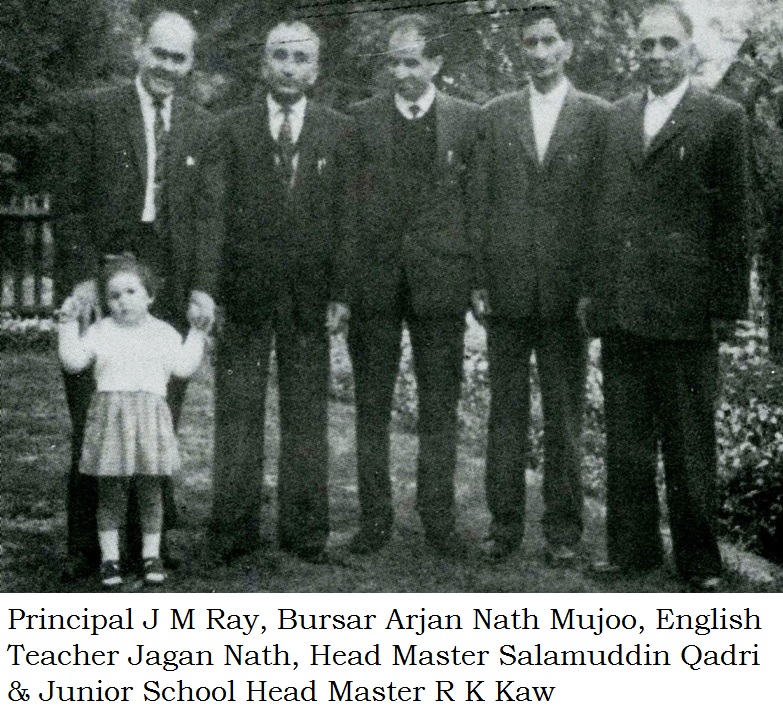 THE ANIMAL LOVER
THE ANIMAL LOVERAnd the animal lover Biscoe witnessed stray dogs, donkeys and cows roaming around freely living on rubbish and litter thrown on the streets created awareness and sympathy. To a large extent people were given to understand that it is as good a noble cause to look after animals as looking after the human beings.
Another uphill task Biscoe faced was the scourge, The Plague that broke out in Srinagar, the capital city of Kashmir. The disease had been transmitted from India by a servant escorting his mistress on a Tonga. The epidemic spread like a wild-fire, thousand died and whole Kashmir was involved. The ignorance, superstition and taboos played a role in persuading people that inoculation was the only way to fight this menace. Biscoe and Dr Arthur Neve another missionary with zeal, in spite of, all odds fought the epidemic on all fronts. The Cholera epidemic of 1892 was the worst of its kind consuming many thousand lives.
FIGHTING SMALLPOX, CHOLERA
Another calamity that plagued Kashmir was smallpox and again Hindu ´learned´ class was overwhelmed believing that goddess Mansa had visited their home and somebody dying this manner will attain salvation on his/her way to swarg (heaven). Again inoculation was against the religion till Biscoe made the public aware the factuality of the situation. The age-old custom of Hindu windows not getting married was fought vigorously by Biscoe in legal forums. With the help of Mr Wakefield and some enlightened Hindus persuaded by Biscoe himself, thereafter the re-marriage of Hindu widows was allowed by law.
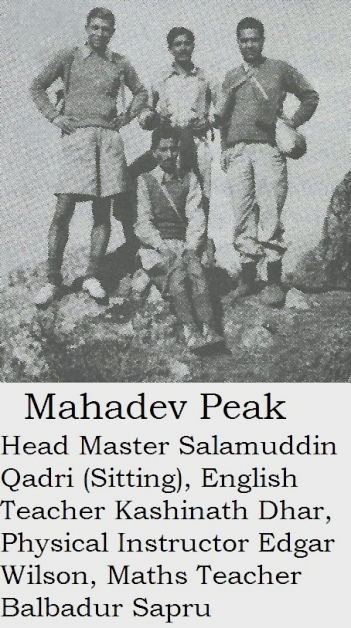 AUTHOR OF THIS WEBSITE
AUTHOR OF THIS WEBSITEKashmir owes Reverend Biscoe a lot and the services he rendered can never be compensated. An historical phenomenon will be remembered for all times to come. The author of this web-site has the honour of being student of the same Biscoe school first at the original Fateh Kadal (3rd Bridge) and later Sheikh Bagh school run efficiently by Principals like JM Ray and VK Johnson. Another privilege enjoyed by this author was to climb the Mahadev Peak twice, once as the senior school student and the year after as the old Biscoe Boy of the school. After leaving the school passed his B.A from Sri Pratap College, Srinagar. Also acquired a three year Degree in Information And Technology from University of Nottingham in United Kingdom and after finishing studies served in the University as a staff member for several years.
Due to exploitation to the hilt, the poverty striken inhabitants looked for any means of sustenance and to this effect Qadri briefly describes Kalhana´s records that many kings in the past enjoyed free sex with beautiful daughters of their ministers and courtiers. These kings also had several prostitutes in their haram and apart from serving as sex objects these prostitutes were used as spies to keep an eye on all serving the kingdom. Mughals from India occupying Kashmir by treachery also followed the custom of exploiting the poor inhabitants of Kashmir. Still later, last Dogra rulers down the line, in order to fill their coffers, encouraged such evil practices and even legalised prostitution. It is on record that nearly 20,000 prostitutes were in business in Srinagar´s Tashwan and Maisuma areas alone. Notably, a local Barbar Muhammad Subhan Hajam revolted against this horrible practice and was instrumental in wiping out these vice dens.
AN UNHOLY TRAFFIC (November 08, 1937)
I was introduced to a brave Kashmiri (Mohammed Subhan). An insignificant looking little Mohammedan, a barber, whose trade is considered a low caste one, lived in a street in Srinagar in which were situated many houses of ill-fame. This man like his neighbours, was continually disturbed at night by the ribald songs accompanied by musical instruments such as the harp and zither, and also by men wrangling. BUt what really upset him were the cries of anguish from the unfortunates recently forced into this cruel life, many of them quite young, who had been sold by their relations under the pretence that marriages had been arranged for them.
The cries of these poor creatures went to his heart and prompted him to action. He went to some decent men he knew, and asked their help to fight this evil. He wrote pamphlets to show up this cruel traffic, and distributed hundreds of them in the city. He would stand up in the streets and preach, and at night, with some of his friends, would stand outside those houses trying to dissuade the men visitors from entering.
The keepers of these houses soon became active, and with help of the police, ran him into the police courts. Their trumped-up charges were continual, so that by degrees he was ruined and had to sell up in order to pay the law costs. But he still had one source of income, which was as barber to his Highness Maharaja's state band, with seventy or so heads to shave. His enemies, however, brought false charges against him to the officer in charge of the band, so he was dismissed. One night he and his friends were picketing a certain house of ill-fame, when who should enter, under cover of darkness, but a police officer who was the son of high official of Kashmir, a Sikh. The barber begged this officer not to enter, but without avail.
At this, the barber ran off to the phone and told the high official where his son was, whereupon he came down and was met by the barber. To the high official's surprise the barber did not ask for hush money but something very different. He said: "I do not ask for money, but if you wish me to keep the matter quiet regarding your son, you must have all this traffic stopped." The official agreed, so the order went forth that all such places be removed from the municipal areas of Srinagar.
Shafi Ahmed Qadri passed matriculation from CMS Tyandale Biscoe School, and his B.Sc (Hons) from Sri Pratap College, Srinagar. Later he joined CMS school as Incharge Biology Section. To seek further knowledge and training he left for Dehradun, India and sought training in Forestry in Northern Forest College. On return got appointed as Range Officer in Kashmir´s Forest Department. Still later worked as Assistant Conservator of Forests.
BISCOE´S LAST DAYS
After 57 years of undaunted service, Biscoe, much against his wish, left Srinagar on October 9, 1947. He left in grand style. 30 of his school staff pulled his car from Sheikh Bagh to Amira Kadal (First Bridge) Bus-Stand and for a quarter mile route ahead played the school band in his honour. On his 86th birthday Biscoe, in his native country England, suffered a heart attack and on August 1, 1949 Biscoe was laid to rest next to his wife Margaret.
CREDIBILITY OF "INCREDIBLE INDIA"One morning of Dec-Jan 1990, notorious Indian CRPF (Central Reserve Police Force) knock at the door of Abdul Ahad Bhat of Batmaloo, Srinagar and demand the TV set to watch their favourite program Ramayana. The lady of the house opens the door to find uniformed armed infantry men staring at her with the demand and the next minute she collapses and is rushed by her relations to the hospital to be declared dead. In Kashmir incredible India does such miracles on daily basis.

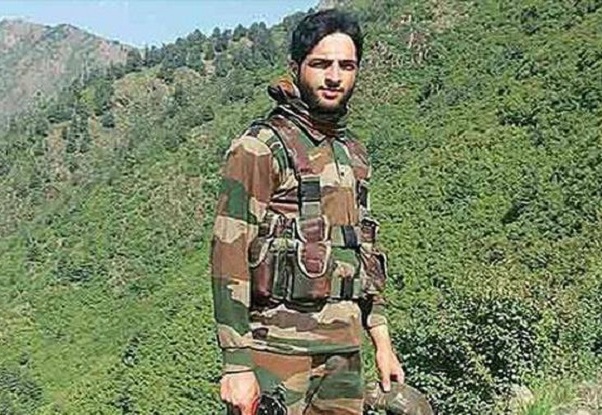





































































 Military Curfews do not deter masses from coming out on the roads to protest Indian rule and continue the fight with stones and bricks to convey the message that India must leave Kashmir. Indian overtures towards Soviet Union were tactfully planned mainly to use USSR VETOs to frustrate rest of the world denying to hold the promised plebiscite in Kashmir. India´s truculent behaviour paid dividends leaving Kashmir simmering on the burner
Military Curfews do not deter masses from coming out on the roads to protest Indian rule and continue the fight with stones and bricks to convey the message that India must leave Kashmir. Indian overtures towards Soviet Union were tactfully planned mainly to use USSR VETOs to frustrate rest of the world denying to hold the promised plebiscite in Kashmir. India´s truculent behaviour paid dividends leaving Kashmir simmering on the burner
